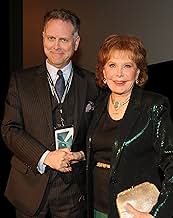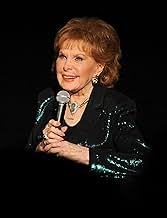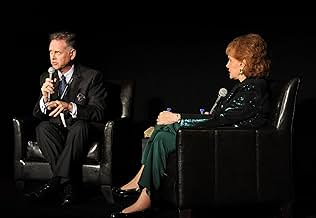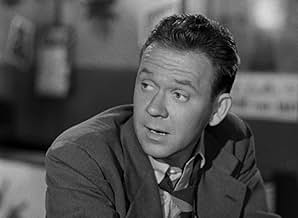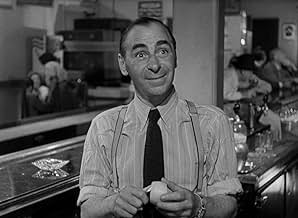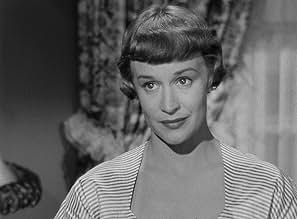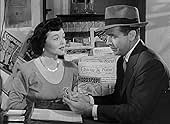NOTE IMDb
7,3/10
2,9 k
MA NOTE
Un homme innocent, récemment libéré de prison, décide de rechercher ceux qui l'ont envoyé en prison afin de se venger d'eux.Un homme innocent, récemment libéré de prison, décide de rechercher ceux qui l'ont envoyé en prison afin de se venger d'eux.Un homme innocent, récemment libéré de prison, décide de rechercher ceux qui l'ont envoyé en prison afin de se venger d'eux.
- Réalisation
- Scénario
- Casting principal
Hy Averback
- Bookie
- (as Hy Averbach)
Leon Alton
- Bartender
- (non crédité)
Robert Bice
- Castro's Gunman
- (non crédité)
Ralph Brooks
- Nightclub Patron
- (non crédité)
Paul Cristo
- Waiter
- (non crédité)
Sayre Dearing
- Cop
- (non crédité)
Avis à la une
Dick Powell, born in Mt. View, Arkansas, had a versatile career, starting out as a song and dance man with hit records who starred in some of the best musicals Hollywood ever made several of them by Busby Berkely. When his career floundered he changed genres and became one of the movies' best tough guys, in many ways better in the role than Humphrey Bogart, although Powell never became the cult hero Bogart became. Powell then went on to success in the new medium of television. While "Cry Danger" is no "Murder, My Sweet," it is an exceptional tough guy flick. One thing that always impressed me about Dick Powell, especially well done in "Murder, My Sweet," is his talk. He could read a line like nobody else. His voice helps make "Cry Danger" more realistic and more exciting to watch. William Conrad's Castro is an excellent foil for Powell's character, Rocky Mulloy. This was before the world came to know a real life villain, Fidel Castro. Today, Conrad's character has become even more dastardly as a result of historical events. There is even a freakish resemblance between Conrad's Castro and the cigar-smoking one in Cuba. Thus Conrad's character is even more menacing. Richard Erdman usually gets on my nerves when I see him in a movie. He had a habit of overplaying his part. But in Cry Danger he has been properly cast and comes off a winner. He ends up with some of the best lines in the film. This is the best acting I have seen him do. Rocky (Dick Powell) and Delong(Erdman)have trouble with their women in "Cry Danger." Both Rhonda Fleming and Jean Porter turn in creditable performances and add to the overall effectiveness of the film. One reviewer commented on the photography. And it's true the photography adds much to the overall impact of the movie. The trailer park is shown in such a realistic manner that the viewer can almost see the cockroaches crawl across the table. The action never slows down. The final scene is a good one. Once you start watching "Cry Danger" you won't want to stop.
Cry Danger (1951)
Humphrey Bogart smiles. Robert Mitchum smiles. Lots of tough film noir types also show a grin or manage a laugh. But not Dick Powell. Forever grim and determined, he is a the archetype of an unhappy man, and usually, as in "Cry Danger," he's out to fix some problem.
This is a Dick Powell movie all the way, and a really good one. There are some great secondary characters, especially the mob leader William Conrad and a suspicious and wise-cracking Marine sidekick played by Richard Erdman. And the plot is good, if twisting slightly and improbable at times. It's also a somewhat cheaply made affair, with a car crash that won't convince a child, and some sets that show their seams. But hey, who cares? It barrels along and stern stiff unflappable Powell (his name is Rocky Mulloy in the movie) won't be stopped, even by love, even by duplicity. And certainly not by cops who should have arrested him several times for his liberties while on parole.
This is director Robert Parrish's first film, and he didn't really direct much later of note except, in 1966, a couple scenes in "Casino Royale." Between the two he did a bunch of so-so westerns. William Conrad, who is thirty at the time of filming here, went on to be television's "Cannon" and "Jake and the Fat Man," but he appeared in a bunch of these B-list noirs and is good every time. The leading woman is a simple type, and good enough at it, but her most memorable role is in "Spiral Staircase," a couple years earlier (definitely see that one). She, too, like half of Hollywood, drifted to t.v. by 1960.
Powell's career is interesting, and his last big role before moving to television himself was in "The Bad and the Beautiful," just a year later. He is never quite a distinctive leading man, and I'm guessing he thought of this as just bread and butter work, but he gives it his usual steely best, and holds the movie together. The other leading character has to be 1950 L.A., without the glamour. Every scene is gritty and real, night and day, and it's yet another sign of end of the studio system and the rise of t.v., with all the location shooting.
A fast, fun one, well filmed.
Humphrey Bogart smiles. Robert Mitchum smiles. Lots of tough film noir types also show a grin or manage a laugh. But not Dick Powell. Forever grim and determined, he is a the archetype of an unhappy man, and usually, as in "Cry Danger," he's out to fix some problem.
This is a Dick Powell movie all the way, and a really good one. There are some great secondary characters, especially the mob leader William Conrad and a suspicious and wise-cracking Marine sidekick played by Richard Erdman. And the plot is good, if twisting slightly and improbable at times. It's also a somewhat cheaply made affair, with a car crash that won't convince a child, and some sets that show their seams. But hey, who cares? It barrels along and stern stiff unflappable Powell (his name is Rocky Mulloy in the movie) won't be stopped, even by love, even by duplicity. And certainly not by cops who should have arrested him several times for his liberties while on parole.
This is director Robert Parrish's first film, and he didn't really direct much later of note except, in 1966, a couple scenes in "Casino Royale." Between the two he did a bunch of so-so westerns. William Conrad, who is thirty at the time of filming here, went on to be television's "Cannon" and "Jake and the Fat Man," but he appeared in a bunch of these B-list noirs and is good every time. The leading woman is a simple type, and good enough at it, but her most memorable role is in "Spiral Staircase," a couple years earlier (definitely see that one). She, too, like half of Hollywood, drifted to t.v. by 1960.
Powell's career is interesting, and his last big role before moving to television himself was in "The Bad and the Beautiful," just a year later. He is never quite a distinctive leading man, and I'm guessing he thought of this as just bread and butter work, but he gives it his usual steely best, and holds the movie together. The other leading character has to be 1950 L.A., without the glamour. Every scene is gritty and real, night and day, and it's yet another sign of end of the studio system and the rise of t.v., with all the location shooting.
A fast, fun one, well filmed.
Somehow, I missed this little gem over the years.
Excellent location filming, combined with a compelling script and great acting - a definite must-see for "film noir" fans. My only complaint is the somewhat stale performance by Rhonda Fleming - I think they needed somebody a bit more "earthy" for the part. Richard Erdman and Jean Porter are excellent in their supporting roles.
It was rare in 1951, to see so many actual locations in a film, but this is obviously a low-budget enterprise. Plus, the nature of "noir" is almost always to utilize reality, as opposed to artifice. I did notice some sloppiness with the usage of studio sets; the interiors of the trailers were, of course, sets, and many times when characters exit, the blank studio wall is clearly visible.
One goof occurs when Powell's character drops off Fleming at her office. As the car drives away, the cameraman is clearly visible in the window's reflection. Of course, who knew then that a viewer would eventually be able to freeze-frame a shot?
Great film.....highly recommended.
Excellent location filming, combined with a compelling script and great acting - a definite must-see for "film noir" fans. My only complaint is the somewhat stale performance by Rhonda Fleming - I think they needed somebody a bit more "earthy" for the part. Richard Erdman and Jean Porter are excellent in their supporting roles.
It was rare in 1951, to see so many actual locations in a film, but this is obviously a low-budget enterprise. Plus, the nature of "noir" is almost always to utilize reality, as opposed to artifice. I did notice some sloppiness with the usage of studio sets; the interiors of the trailers were, of course, sets, and many times when characters exit, the blank studio wall is clearly visible.
One goof occurs when Powell's character drops off Fleming at her office. As the car drives away, the cameraman is clearly visible in the window's reflection. Of course, who knew then that a viewer would eventually be able to freeze-frame a shot?
Great film.....highly recommended.
Dick Powell, Rhonda Fleming, Regis Toomey, Richard Erdman, and Jean Porter star in "Cry Danger," a 1951 film directed by Robert Parrish.
Powell plays Rocky Mulloy, an ex-con, recently released from prison after an alibi appears that clears him of a robbery/murder. The alibi is a Marine (Erdman) named DeLong who says that he and Powell were drinking together at the time the job was pulled.
In truth, Powell didn't commit the crime. However, he has never seen this Marine before in his life. The Marine wants money from the robbery.
The two rent a trailer in a trailer park, where the wife (Rhonda Fleming) of his ex-partner, who is still in prison, lives. She's actually an old girlfriend of Rocky's and the two are still attracted to one another.
Rocky goes after a bookie (William Conrad) who cheated him and unknowingly bets on a fixed race, is paid in the robbery money, which sends the police after him.
It's good to read the comments for this film and realize that many people appreciate the versatility and talent of Dick Powell. He was many things to many people - a wonderful singer, a great tough guy, a savvy businessman, a good director, and a marvelous producer who launched Sam Peckinpah and Aaron Spelling. Not all of his later films were "A" productions, but he was always excellent.
The performances by Erdman and Conrad are very good. Rhonda Fleming is her usual beautiful self, and Jean Porter plays a lively party girl.
This is a good noir that captures the atmosphere of post-war LA, the down and out side of it. It's exciting and a little unpredictable, too, enough to keep you watching.
Powell plays Rocky Mulloy, an ex-con, recently released from prison after an alibi appears that clears him of a robbery/murder. The alibi is a Marine (Erdman) named DeLong who says that he and Powell were drinking together at the time the job was pulled.
In truth, Powell didn't commit the crime. However, he has never seen this Marine before in his life. The Marine wants money from the robbery.
The two rent a trailer in a trailer park, where the wife (Rhonda Fleming) of his ex-partner, who is still in prison, lives. She's actually an old girlfriend of Rocky's and the two are still attracted to one another.
Rocky goes after a bookie (William Conrad) who cheated him and unknowingly bets on a fixed race, is paid in the robbery money, which sends the police after him.
It's good to read the comments for this film and realize that many people appreciate the versatility and talent of Dick Powell. He was many things to many people - a wonderful singer, a great tough guy, a savvy businessman, a good director, and a marvelous producer who launched Sam Peckinpah and Aaron Spelling. Not all of his later films were "A" productions, but he was always excellent.
The performances by Erdman and Conrad are very good. Rhonda Fleming is her usual beautiful self, and Jean Porter plays a lively party girl.
This is a good noir that captures the atmosphere of post-war LA, the down and out side of it. It's exciting and a little unpredictable, too, enough to keep you watching.
Like the old Sinatra song, things can be far better the second time around. The first time I saw "Cry Danger" it was shortly after a viewing of "Murder, My Sweet" and it just couldn't compare to that classic. I recently viewed the movie again and I must say that "Cry Danger" was a lot of fun.
The real stars of the movie are 1) the dialogue, and 2) Dick Powell's delivery of that dialogue. Bogart and Mitchum are blue collar guys who deliver these kinds of one-liners beautifully...and it stings...but Powell has an air of elegance and intelligence wrapped in a white collar, so when he gets caustic, condescending, sarcastic, and nasty, it seems to hurt even more. And it hurts so good. There is nothing more delicious to Noir fans than Powell letting rip with a great one-liner. And the more casual he is, the more "tossed away" the line is delivered, the more we grin with satisfaction. It's just a thing of beauty.
The supporting cast is good, with just about everyone pulling their weight admirably. William Conrad, Regis Toomey, and Rhonda Fleming are in fine form. I was expecting twists, turns, and deceit from Erdman's character, but after an interesting reveal in the beginning of the film, his character seems to be abandoned and left only to provide some comic relief. That missed opportunity aside, though, the script is fun and moves along briskly.
The direction is just fine, though not as dark as I would have liked it...but that is a minor complaint. There is a rawness and realism to these B films that I find much more rewarding than a lot of the glossy A films produced.
8 out of 10 for a thoroughly enjoyable hour and a half crawl through the seedy underbelly of Tinsel Town.
The real stars of the movie are 1) the dialogue, and 2) Dick Powell's delivery of that dialogue. Bogart and Mitchum are blue collar guys who deliver these kinds of one-liners beautifully...and it stings...but Powell has an air of elegance and intelligence wrapped in a white collar, so when he gets caustic, condescending, sarcastic, and nasty, it seems to hurt even more. And it hurts so good. There is nothing more delicious to Noir fans than Powell letting rip with a great one-liner. And the more casual he is, the more "tossed away" the line is delivered, the more we grin with satisfaction. It's just a thing of beauty.
The supporting cast is good, with just about everyone pulling their weight admirably. William Conrad, Regis Toomey, and Rhonda Fleming are in fine form. I was expecting twists, turns, and deceit from Erdman's character, but after an interesting reveal in the beginning of the film, his character seems to be abandoned and left only to provide some comic relief. That missed opportunity aside, though, the script is fun and moves along briskly.
The direction is just fine, though not as dark as I would have liked it...but that is a minor complaint. There is a rawness and realism to these B films that I find much more rewarding than a lot of the glossy A films produced.
8 out of 10 for a thoroughly enjoyable hour and a half crawl through the seedy underbelly of Tinsel Town.
Le saviez-vous
- AnecdotesIn an interview with Tom Weaver, Jean Porter said the film was "directed by Dick Powell, and he wasn't given director credit. Dick gave Robert Parrish the director's credit, but Dick did all the directing."
- GaffesAs Rocky drives away after dropping Nancy off at work, the cameraman and camera are reflected in the car's rear window glass.
- Citations
Darlene LaVonne: You drinkin' that stuff so early?
Delong: Listen, doll girl, when you drink as much as I do, you gotta start early.
- ConnexionsEdited from Crack-Up (1946)
Meilleurs choix
Connectez-vous pour évaluer et suivre la liste de favoris afin de recevoir des recommandations personnalisées
- How long is Cry Danger?Alimenté par Alexa
Détails
- Date de sortie
- Pays d’origine
- Sites officiels
- Langue
- Aussi connu sous le nom de
- L'implacable
- Lieux de tournage
- New Grand Hotel - 257 Grand Avenue, Bunker Hill, Downtown, Los Angeles, Californie, États-Unis(Crosley Hotel - exteriors and interors)
- Sociétés de production
- Voir plus de crédits d'entreprise sur IMDbPro
- Durée1 heure 19 minutes
- Couleur
- Rapport de forme
- 1.37 : 1
Contribuer à cette page
Suggérer une modification ou ajouter du contenu manquant

Lacune principale
By what name was L'implacable ennemie (1951) officially released in India in English?
Répondre

